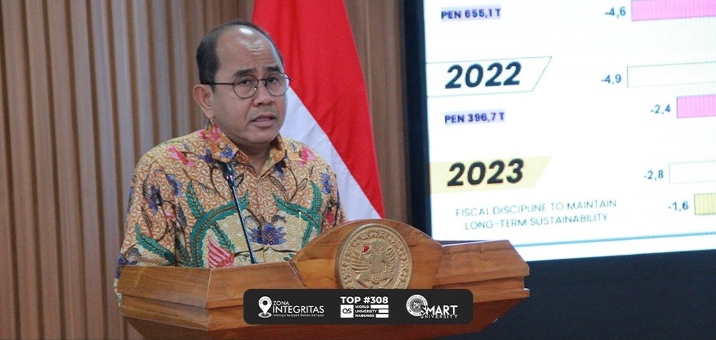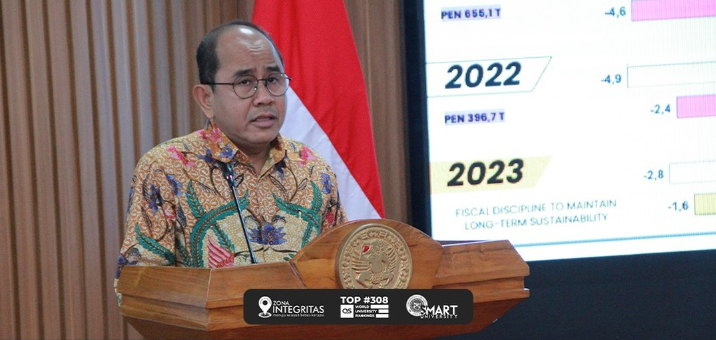Berita UNAIR Pascasarjana, Kamis, 12 September 2024 – Surabaya, 11 September 2024 The 2024 International Conference of Universitas Airlangga Postgraduate School (ICPS 2024) continued its focus on “Transformation towards The 2030 Sustainable Development Agenda: Multidisciplinary Approaches,” gathering experts and stakeholders to discuss key global and national challenges. Notable keynote speakers included Parjiono, Ph.D., Expert Staff in Macroeconomics and International Finance, and Amalia Adininggar Widyasanti, S.T., M.Si., M.Eng., Ph.D., Deputy Minister for Economic Affairs at the Ministry of National Development Planning/Bappenas.
Parjiono emphasized the current and future global risks, including climate change, aging populations, technological advancements, and geopolitical stagnation, which are projected to impact the global economy by 2025. He highlighted that Indonesia is expected to achieve a 3.3% growth rate next year, driven by robust exports, household consumption, and strategic policies, despite global economic uncertainties.
He stressed that Indonesia’s economic resilience, supported by effective fiscal management and strategic policymaking, has maintained stability amid global challenges. Strong export performance and robust household consumption have driven growth. However, Parjiono warned of emerging risks like climate change, technological disruptions, and geopolitical tensions that could affect future stability. He highlighted Indonesia’s young, dynamic population as a key asset, suggesting that investing in education, innovation, and entrepreneurship could enhance competitiveness and help the country achieve its goal of becoming a global economic leader.
Parjiono also highlighted Indonesia’s response to climate change, particularly its vulnerability as an archipelagic state. He noted that the government has taken significant steps in enhancing its national contributions to the UNFCCC in 2022, setting ambitious targets for zero emissions by 2060.
Amalia underscored the importance of high-quality data in development, noting that the Government of Indonesia is committed to strengthening data systems to support decision-making. “All data must have metadata and be easily shared and integrated,” she stated, commending the role of Indonesia’s Central Bureau of Statistics (BPS) in maintaining the accuracy and reliability of statistical data. BPS has introduced innovative methods such as using satellite imagery and social media data to produce critical SDG indicators. She also emphasized the need for innovation in the production of non-traditional data, such as big data and social media analytics, which can provide real-time information and aid policymakers in addressing SDG-related challenges.
Both keynote speakers underscored Indonesia’s strong commitment to sustainable development and the SDGs. Parjiono pointed out Indonesia’s leadership role in global climate action, while Amalia Adininggar Widyasanti highlighted the importance of reliable data and innovation in addressing the multifaceted challenges posed by the SDGs. As the conference progresses, ICPS 2024 is providing a critical platform for discussions on Indonesia’s development, sustainability goals, and its role in the global community. The conference’s focus on innovation, collaboration, and leadership aligns with the nation’s ambitious plans for 2045, ensuring a future that is inclusive, resilient, and sustainable.
To support these goals, Parjiono pointed to key funding sources such as PT Sarana Multi Infrastruktur and the Environmental Fund Management Agency (BPDLH), emphasizing the crucial role of sustainable funding mechanisms in ensuring the long-term success of these initiatives.
Moreover, Parjiono spoke about Indonesia’s climate action strategies, which include adhering to the Paris Agreement and setting ambitious goals like achieving net-zero emissions by 2060. He discussed the country’s efforts in implementing environmental policies across key sectors, particularly in reducing carbon emissions. The government’s collaboration with the private sector and multilateral funding bodies, such as the Green Climate Fund, has been pivotal in driving forward these initiatives.
Amalia Adininggar Widyasanti addressed the audience on the topic of “Addressing Multidimensional Challenges: Commitment and Innovation in SDGs Provision.” She emphasized that the global challenges we face today—such as inflation, geopolitical tensions, and environmental issues—require a multidimensional approach, particularly in ensuring inclusive and sustainable development for the future.
In 2016, 193 countries adopted the Sustainable Development Goals (SDGs), which have been pivotal in steering Indonesia toward its ambitious vision of becoming a sovereign, advanced, and sustainable nation by 2045. Key milestones include overcoming the middle-income trap by 2041, achieving the iSDGs (integrated Sustainable Development Goals) by 2030, and solidifying its status as an upper-middle-income country, a position Indonesia has held since 2022.
Follow Sosial Media Sekolah Pascasarjana Unair =
(Instagram, YouTube, Facebook, LinkedIn, Twitter, Spotify, TikTok)
source
https://unair.ac.id/
